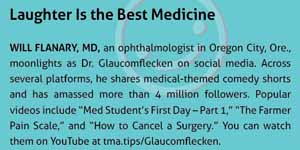
By May 2020, Will Flanary, MD, an ophthalmologist in Oregon City, Ore., already was a two-time survivor of testicular cancer. His treatment and recovery had coincided with medical school, residency, and early practice.
The experience had been isolating, and comedy was a salve. For years, he had posted medical-themed shorts on social media under the moniker Dr. Glaucomflecken. With the onset of the COVID-19 pandemic, he ramped up his online output, notching millions of viewers on platforms like TikTok and Instagram. But another medical crisis was looming – one that would transform his approach and sharpen his message.
That month, while sleeping, he suffered an unexplained cardiac arrest, from which his wife saved him by performing 10 consecutive minutes of chest compressions until paramedics arrived.
In the aftermath, he felt a surge of empathy for patients and “co-survivors,” the loved ones and caregivers with whom they navigate follow-up care, claim denials, and surprise medical bills.
“This is when I first started making videos about the American health care system,” he told the audience at TexMed, the Texas Medical Association’s annual conference, in Dallas on May 4.
Freshly galvanized, Dr. Flanary made a video about prior authorizations, which prompted an immediate response from viewers, many of whom had been affected by the resulting care delays and misplaced blame on their physicians.
“It taught me about the value of social media when it comes to advocacy,” he said, adding that the public is eager for a forum in which to discuss payers’ problematic policies and other barriers to care.
Physicians are, too.
Kerolos Youssef, MD, a family physician in Huntsville, has watched Dr. Glaucomflecken videos on TikTok and sought a selfie with Dr. Flanary ahead of his closing session speech.
“The influence he has is obvious,” he told Texas Medicine.
Dr. Youssef appreciates that Dr. Flanary’s comedy tackles insurance issues, the resolution of which often feels insurmountable to individual physicians.
“Right now, I’m seeing those with my patients, and I’m really hating it,” he said.
Jennifer Blankenship, MD, a pathologist in Austin, agrees. She deals with the same challenges as a physician and as a patient herself.
“His use of comedy to discuss real issues in medicine is a good way to approach it,” she said.
To complement and amplify more traditional methods, Dr. Flanary is now an evangelist for social media as a physician advocacy tool.
“That’s where the public is,” he told Texas Medicine. “And we need as many people as possible to understand what the problems are in health care.”
He urges fellow physicians to share their expertise in such forums, whether by making TikTok videos, like he does; posting on Facebook; or talking among friends.
“People find physicians interesting,” he said. “So, no matter what platform [or] how big your audience, just get up there and talk about it.”
Texas roots
Dr. Flanary’s path to his self-described “weird job” as an “internet comedian ophthalmologist” began in the Lone Star State.
He grew up in Houston, where he dreamed of becoming a doctor and performing stand-up comedy. He attended open-mic nights at the now-defunct Laff Stop as a high school student. After graduating from Texas Tech University, where he met his wife, Kristin, also known as “Lady Glaucomflecken,” he attended the Geisel School of Medicine at Dartmouth.
“I went the much easier route of becoming a doctor,” he joked.
During his third year of medical school, he received his first cancer diagnosis. Although he ultimately recovered, he felt out of place in the cancer ward, where patients generally were much older.
“Mentally, emotionally, it was a huge hurdle for me,” he said.
To cope, he began writing comedic material again, this time about being a medical student and undergoing treatment.
“That’s why so many of us have a wonderful sense of humor in medicine – because we have to,” he said. “It helps us process.”
Four years later, during his residency at the University of Iowa, he was diagnosed with cancer a second time, prompting existential questions about his upcoming job search and growing his young family.
Comedy, once again, was a crucial part of recovery. In May 2016, he started his Dr. Glaucomflecken account on the platform now known as X, then Twitter, expanding his repertoire from “painfully specific ophthalmology jokes” to medicine more generally while growing his audience.
With a clean bill of health, he and his family relocated to the Pacific Northwest, where he started his independent practice.
Advocacy through comedy
Dr. Glaucomflecken, itself an alter ego, often assumes different characters: an optimistic ophthalmologist, his loyal scribe, an arrogant neurologist, an adrenaline-seeking emergency physician, a patient pediatrician, and a paternal psychiatrist. Whatever the role, Dr. Flanary deploys humor to advocate for a more functional health care system.
When developing videos, he’s choosy about topics, preferring those that significantly impact the public – even if they may not know about them. For instance, he’s tackled pharmacy benefit managers – which, he said, “really affect people’s ability to get their medications and affordable access” – and the Change Healthcare cyberattack. (See “Virtual Vigilance,” June 2024 Texas Medicine, pages 42-46, www.texmed.org/VirtualVigilance.)
He also does a lot of research to ensure his videos are as accurate as they are entertaining.
“The last thing I want to do is spread any misinformation accidentally,” he told Texas Medicine.
His hard work has paid off. In July 2021, Aetna began requiring prior authorization for cataract surgery, claiming it would help prevent unnecessary surgeries, according to reports. Outraged, Dr. Flanary made a video in April 2022 pointing out the “huge burden on patients and doctors” that would result from the policy change as well as the potential profit motive for delaying care (tma.tips/AetnaCataract).
“If nothing else, I made them mad,” he said.
But Aetna ultimately reversed the policy in July 2022 (www.texmed.org/AetnaReversal). For this reason and others, Dr. Flanary sees his comedy as dovetailing with other physician advocacy efforts and commended TMA for its own wins in this arena, including Texas’ landmark 2003 medical liability reforms and its 2021 gold-card law, which has inspired similar legislation in other states and at the federal level.
“You guys have done an amazing job with advocacy,” he said during his speech. “You’ve set the standard in a lot of ways.”

The appreciation is mutual.
TMA House Speaker Brad Holland, MD, an otolaryngologist in Waco, lauded Dr. Flanary at TexMed for his videos’ accessibility and for “stick[ing] it to UnitedHealthcare like nobody else,” drawing applause from the audience. He also values the opportunity to laugh, given the severity of physician burnout.
“It’s heartwarming,” Dr. Holland said.
Looking ahead, Dr. Flanary hopes to see more physician advocates in his social feeds, and he believes their patients do, too.
“Your voice has weight, as physicians,” he said. “Your voice has power.”